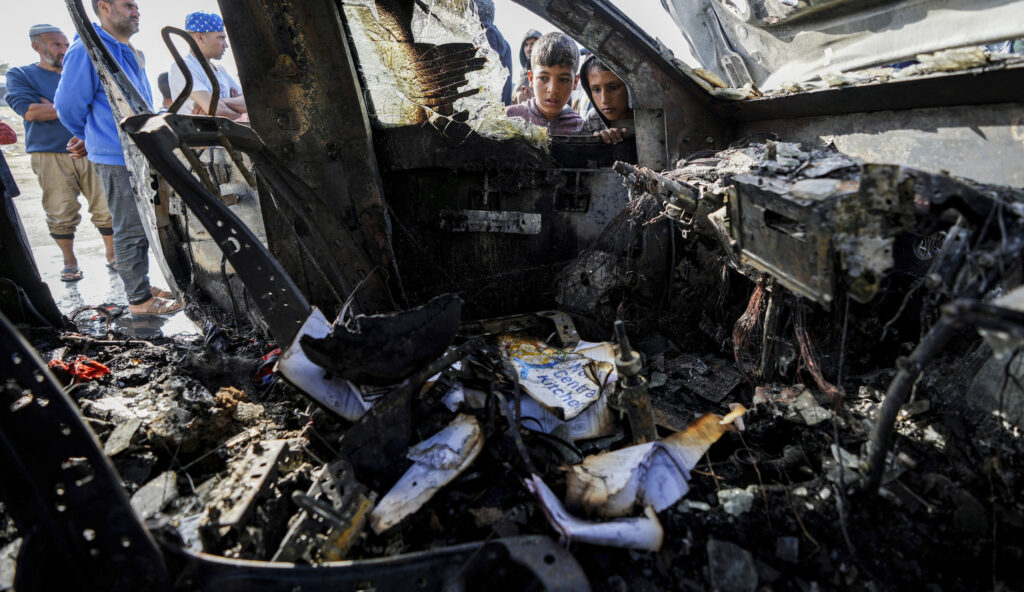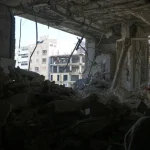
The Israel Defense Forces decided to fire and reprimand some of the officers involved in the devastating airstrikes that killed seven aid workers in Gaza following the military’s investigation.
The brigade fire support commander will be released from his position, as will the brigade chief of staff, while the brigade commander, the 162nd Division commander, and the commander of Southern Command will be reprimanded. The military announced its findings on Friday.
On Monday, Israeli forces carried out multiple strikes on a convoy of vehicles carrying aid workers with the World Central Kitchen. The strikes were approved and launched despite WCK’s efforts to ensure their safety by coordinating their travel with the IDF.
Investigators concluded the strikes “should not have occurred” and that the military personnel who approved the strikes “were convinced that they were targeting armed Hamas operatives and not WCK employees.”
Israeli forces identified a gunman on one of the aid trucks as it left the warehouse where they unloaded aid, per investigators.
“One of the commanders mistakenly assumed that the gunmen were located inside the accompanying vehicles and that these were Hamas terrorists. The forces did not identify the vehicles in question as being associated with WCK,” the IDF’s announcement of the results of the investigation said. “Following a misidentification by the forces, the forces targeted the three WCK vehicles based on the misclassification of the event and misidentification of the vehicles as having Hamas operatives inside them, with the resulting strike leading to the deaths of seven innocent humanitarian aid workers.”
“The strikes on the three vehicles were carried out in serious violation of the commands and IDF Standard Operating Procedures,” it continued.
The Joint Chiefs of Staff’s Fact-Finding and Assessment Mechanism conducted the investigation, and findings were presented to IDF chief of staff Herzi Halevi.
While this was not the first time aid workers have been killed during the nearly six months of war in Gaza — roughly 200 aid workers have been killed, making it one of the deadliest conflicts for humanitarian workers — Monday’s strikes prompted international outrage, including from the United States.
President Joe Biden spoke with Israeli Prime Minister Benjamin Netanyahu on Thursday to discuss the strike against the aid workers, who were employed with the Jose Andres-founded aid organization.

Biden has long supported Israel’s right to self-defense in the aftermath of Hamas’s Oct. 7 terrorist attacks in southern Israel. Despite that support, the Biden administration has repeatedly urged Israel to do more to protect civilians in Gaza, but the president has also continued to provide Israel with military assistance.
The U.S. president gave his Israeli counterpart an ultimatum during a call on Thursday, demanding Israel change its military tactics to protect civilians and aid workers or face the possibility of the U.S. conditioning its aid to Israel.
“He made clear the need for Israel to announce and implement a series of specific, concrete, and measurable steps to address civilian harm, humanitarian suffering, and the safety of aid workers,” a readout of the Biden-Netanyahu call from the White House said. “He made clear that U.S. policy with respect to Gaza will be determined by our assessment of Israel’s immediate action on these steps.”
The possible conditioning of U.S. aid on specific Israeli actions represents a reversal in policy. Administration officials have defended the U.S.’s continued unconditioned military support for Israel until the aftermath of the strike.
National Security Council spokesman John Kirby did not elaborate on what conditions the president set for Israel should it not change its operating procedures regarding Gaza.
“What we are looking to see and hope to see here in the coming hours and days is a dramatic increase in humanitarian assistance getting in, additional crossings opened up, and a reduction in the violence against civilians and certainly aid workers,” he told reporters on Thursday. “In the coming days, we will be looking for concrete, tangible steps.”
Following the call, Israel’s security cabinet approved the reopening of the Erez crossing between Israel and northern Gaza to allow for more aid to get into the strip, according to CNN. The U.S. is among a multitude of countries that believe Israel needs to allow more aid into Gaza, given the continued and worsening humanitarian crisis within the strip.
CLICK HERE TO READ MORE FROM THE WASHINGTON EXAMINER
Biden, according to the readout, also “underscored that an immediate ceasefire is essential to stabilize and improve the humanitarian situation and protect innocent civilians.”
The U.S., Egypt, and Qatar have operated as mediators for months, trying to get Israel and Hamas to agree to a ceasefire and hostage release deal, but to no avail recently. Israel and Hamas agreed to a short-term ceasefire in late November, which lasted for a week and allowed for the release of roughly 100 of the Israeli hostages who had been kidnapped by Hamas terrorists on Oct. 7.







